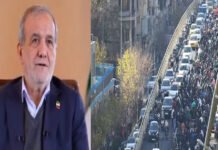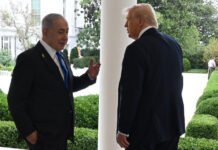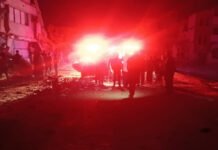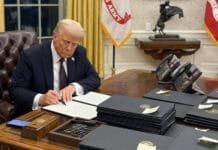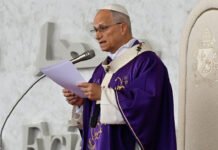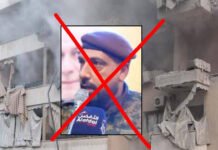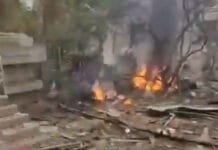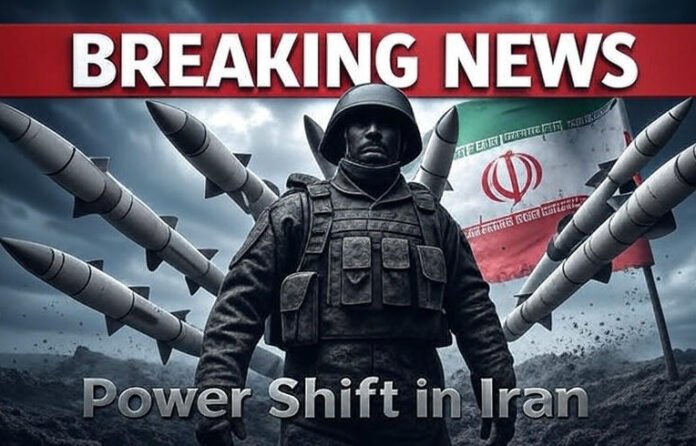
INVC NEWS
Middle East – : The Islamic Revolutionary Guard Corps (IRGC), Iran’s elite military force, is on the verge of consolidating unprecedented political and military control as regional hostilities intensify. Following devastating Israeli strikes that eliminated high-ranking commanders and crippled Iran’s strategic missile leadership, the IRGC is rapidly transforming from an already dominant military entity into the likely arbiter of national leadership succession.
Strategic Israeli Strikes Decimate Iran’s Military Elite
Israel’s recent offensive did not just target Iran’s forward positions or proxy assets—it directly targeted the core of Iranian power: the IRGC. The elimination of key IRGC personnel, including the chief architect of Iran’s missile program, has crippled Iran’s military planning apparatus. Tel Aviv’s strategy appears designed to erode not only Iran’s offensive capabilities but also disrupt the internal power dynamics within the Islamic Republic.
In response, the Revolutionary Guard launched daily missile salvos at Israeli military and civilian targets, including a major hospital in Tel Aviv. These counterattacks have demonstrated both resilience and capability, even as the Iranian regime suffers its most severe existential crisis in over four decades.
Khamenei’s Dependence on the Guard
Supreme Leader Ayatollah Ali Khamenei’s authority has long been propped up by the unwavering loyalty of the IRGC. But with his leadership increasingly seen as vulnerable, it is becoming clear that the real power resides in the hands of the Guard. Analysts suggest that if Khamenei is incapacitated or overthrown, the IRGC is poised to intervene and dictate the succession, possibly installing a more hardline cleric as a figurehead while exercising de facto control.
“The balance of power within Iran… will shift in the direction of the military,” warned Ray Takeyh, a senior fellow at the Council on Foreign Relations. “Those in charge will be the men with guns.”
IRGC’s Expanding Military-Economic Complex
Founded in 1979 after the Islamic Revolution, the IRGC is far more than a military force. With over 125,000 active personnel, it maintains its own army, navy, air force, intelligence units, and elite Quds Force. But its reach extends well beyond military domains. The Guard controls major swaths of Iran’s economy, dominating sectors such as oil and gas, telecommunications, construction, and even consumer goods.
The economic leverage wielded by the IRGC is formidable. Through parastatal foundations and covert commercial arms, it operates hundreds of companies that employ millions of Iranians. These vast holdings not only fund military operations but also ensure loyalty from the populace dependent on IRGC-affiliated jobs and subsidies.
IRGC’s Political Power Beyond the Battlefield
The Islamic Republic is structured as a theocratic republic, but actual power is fragmented across clerical, political, and military bodies. Over time, however, the IRGC has evolved into the most cohesive and powerful actor in the Iranian system. Its influence spans the judiciary, legislature, intelligence services, and foreign policy strategy, effectively operating as a state within a state.
The IRGC’s grip on Iranian politics became more visible following the 2019 U.S. designation of the group as a Foreign Terrorist Organization. The Trump administration’s assassination of Qassem Soleimani in January 2020—then commander of the Quds Force—was aimed at weakening the Guard’s external reach, but had the unintended effect of consolidating domestic unity around IRGC hardliners.
The Succession Question: Who Rules Next?
With Khamenei aging and questions surrounding succession intensifying, analysts are almost unanimous: the IRGC will play kingmaker. It is widely believed that any future Supreme Leader will need IRGC approval, whether that figure is a religious authority or a more technocratic front. Some scenarios even suggest the Guard could push for a military-led transitional council, ensuring it remains the de facto power broker behind a nominal theocratic front.
Such a shift would represent a historic transformation of the Islamic Republic, replacing clerical primacy with a military-political oligarchy where commanders rule from behind the curtain. This would likely trigger a more hawkish, nationalistic foreign policy, particularly against the U.S., Israel, and Gulf Arab states.
U.S. and Global Responses to the Growing IRGC Power
The international community, particularly Washington, has struggled to contain the rising power of the Guard. Sanctions have failed to dismantle the IRGC’s economic empire, and assassinations have only spurred tighter integration between military and political spheres within Iran.
The IRGC’s influence now extends beyond Iran’s borders, shaping militias and proxy networks in Iraq, Syria, Lebanon, Yemen, and beyond. These proxies—funded and armed by the Quds Force—have been activated with increasing frequency as the conflict escalates. Global shipping routes in the Strait of Hormuz are once again at risk, and Tehran’s support for Hezbollah and the Houthis is intensifying, reflecting the Guard’s broader strategic doctrine.
An Empire with Guns and Governance
According to Ali Alfoneh, a leading expert on the IRGC, “Millions of people depend on the economic empire of the Revolutionary Guard.” This statement underscores the dual reality of the IRGC: an armed force and a governing body. The Guard is now interwoven into every fabric of Iranian life—from security to spirituality, economy to education.
This integration ensures that any foreign attempt to dismantle the Guard would destabilize Iran itself. Internally, few institutions can rival its organizational depth, financial autonomy, or popular influence.
What the Future Holds
The likelihood of IRGC-led Iran is growing. With Khamenei’s regime vulnerable, Israeli and U.S. pressure increasing, and internal factions collapsing under crisis, the Guard’s dominance is solidifying. Whether or not an actual military junta emerges, Iran’s policy direction will be set by uniformed commanders, not clerics or elected politicians.
This transformation could radicalize regional geopolitics, lead to more confrontations in Lebanon, Syria, and Iraq, and push Tehran further away from diplomacy and closer to hardline militarism.
The Revolutionary Guard Corps is no longer just a protector of the regime—it is the regime. The question now is not whether it will gain more power, but how it will reshape the future of Iran and its place in the global order.

